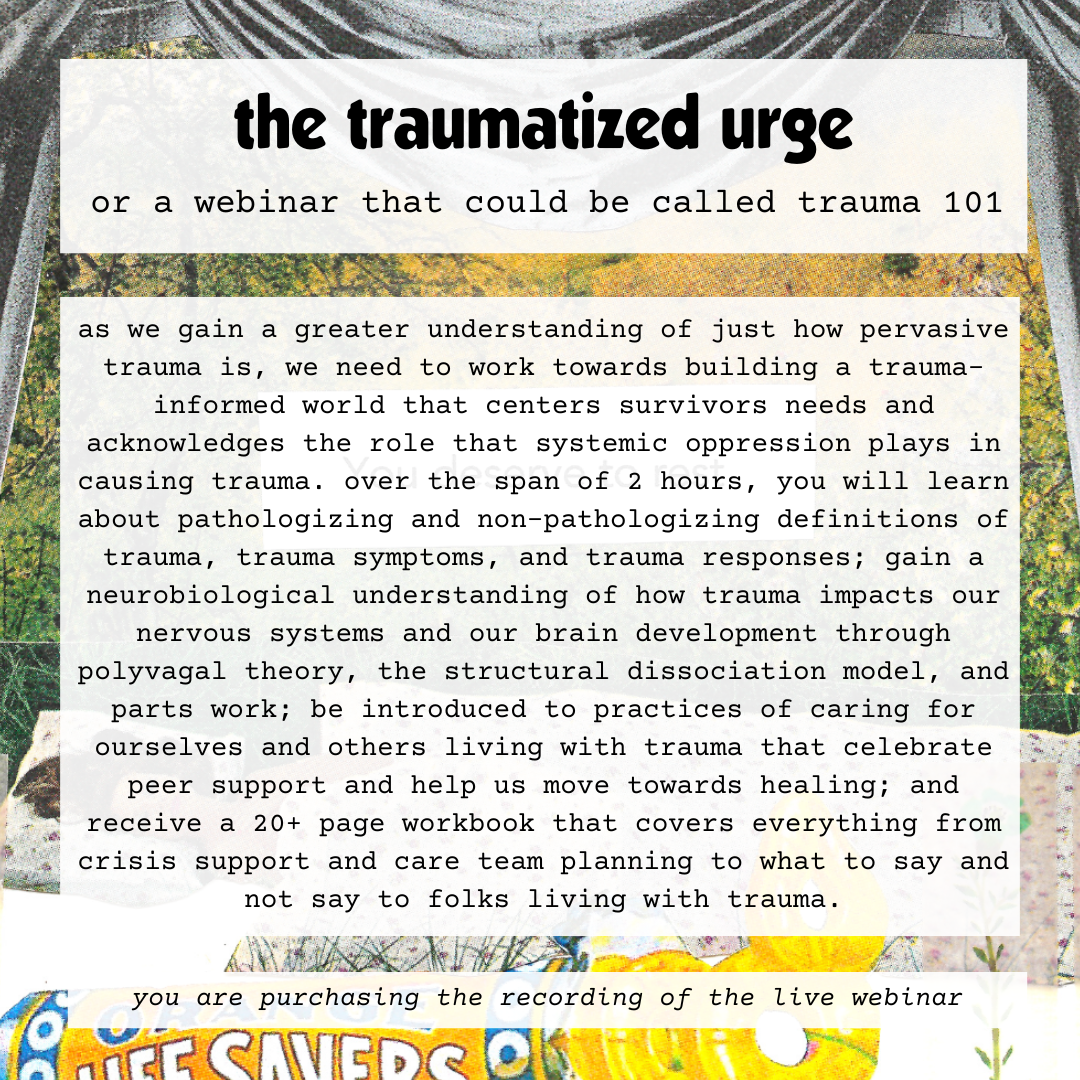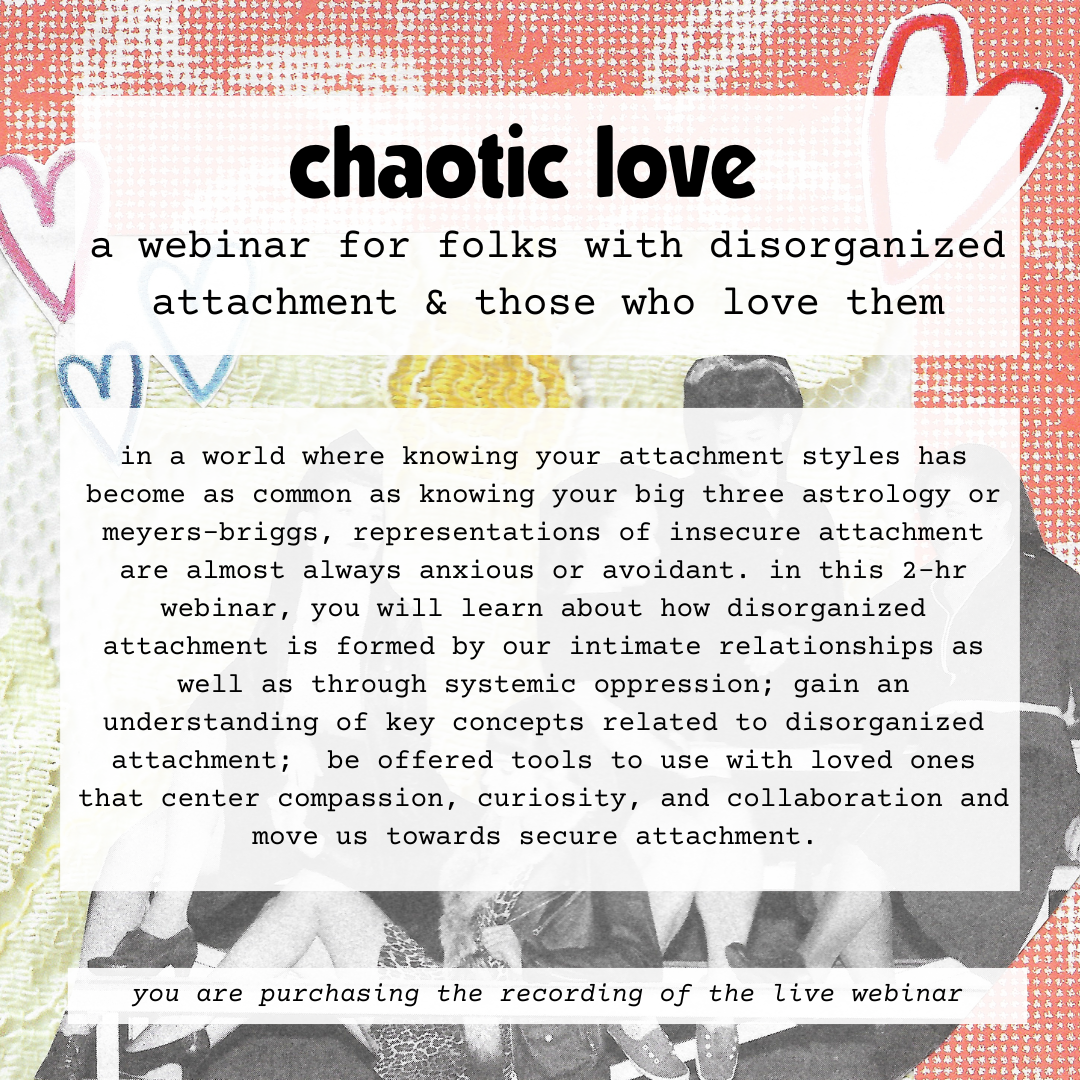 Image 1 of 1
Image 1 of 1


the traumatized urge
The Traumatized Urge
Or, a webinar that could be called Trauma 101 but that didn't sound as fun
A recording of the live webinar with lifetime access to rewatch.
As we gain a greater understanding of just how pervasive trauma is, we need to work towards building a trauma-informed world. The reality is that medically accepted definitions of trauma remain limited to post-traumatic stress disorder, leaving so many of us with complex trauma alone to figure out a) that we even live with trauma; and b) how to cope with our symptoms. It doesn’t help that so many medical practitioners subscribe to a pathologizing framework in which living with trauma is seen as a sign that the individual is broken and in need of a cure, which deepens trauma survivors’ experiences of shame and prevents us from receiving the care we need to heal. We need a depathologized understanding of trauma that centres survivors needs, celebrates the magic of peer support, and acknowledges the role that systemic oppression plays in causing trauma.
In this two hour webinar, participants will:
Learn about pathologizing and non-pathologizing definitions of trauma, trauma symptoms, and trauma responses.
Gain a neurobiological understanding of how trauma impacts our nervous systems and our brain development through polyvagal theory, the structural dissociation model, and parts work.
Be introduced to practices of caring for ourselves and others living with trauma that celebrate peer support and help us move towards healing.
Receive a 20+ page workbook that covers everything from crisis support and care team planning to what to say and not say to folks living with trauma.
About the facilitator: Margeaux Feldman is a writer, educator, peer support worker, and community builder whose work focuses on trauma, chronic illness, interpersonal relationships, and care. They hold a PhD in English Literature and Sexual Diversity Studies from the University of Toronto, where they also earned certificates in Community Engaged Learning and Conflict Resolution. Margeaux spent three years working as a peer advisor at the Graduate Conflict Resolution Centre before creating their workshop series on trauma-informed conflict resolution. Margeaux also created “How to Talk to Your Students About Mental Health” and has trained over 300 teaching assistants, course instructors, faculty, administrators, and peer support providers.
Workshop Cost:
I strive to make my offerings accessible for everyone, regardless of income. I've created a few differesupport@margeauxfeldman.comnt sliding scale options with the hopes that those who can contribute more will do so, thus enabling me to offer free/low-cost spots to those who need them.
The costs below are in Canadian Dollars
Level 1: FREE for BIPOC. These spots are reserved for Black, Indigenous, and People of Colour.
Level 2: $30. For those who’re low income, no savings, have minimal expendable income each month, and couldn't otherwise afford to attend without this option.
If you are a white person who cannot afford the Level 2 cost, you may contact support@margeauxfeldman.com to ask for a low-income sponsorship or reduced rate. No one will be turned away. No questions asked.
Level 3: $50. For those who’re low to mid-income, with some money in savings and/or financial support from family; has some expendable income each month.
Level 4: $70. For those who’re mid- to high-income/stably employed, with savings account and financial safety net; can afford to take vacations and make other large purchases with relative ease.
Level 5: $90. For those who’re upper class and/or have benefited from intergenerational wealth.
If you have any questions, you can contact me at hello@margeauxfeldman.com
Given that the majority of customers are based outside of Canada, the prices are in USD. If you live in Canada and the exchange rate is an access barrier, please reach out to support@margeauxfeldman.com for a discount code
The Traumatized Urge
Or, a webinar that could be called Trauma 101 but that didn't sound as fun
A recording of the live webinar with lifetime access to rewatch.
As we gain a greater understanding of just how pervasive trauma is, we need to work towards building a trauma-informed world. The reality is that medically accepted definitions of trauma remain limited to post-traumatic stress disorder, leaving so many of us with complex trauma alone to figure out a) that we even live with trauma; and b) how to cope with our symptoms. It doesn’t help that so many medical practitioners subscribe to a pathologizing framework in which living with trauma is seen as a sign that the individual is broken and in need of a cure, which deepens trauma survivors’ experiences of shame and prevents us from receiving the care we need to heal. We need a depathologized understanding of trauma that centres survivors needs, celebrates the magic of peer support, and acknowledges the role that systemic oppression plays in causing trauma.
In this two hour webinar, participants will:
Learn about pathologizing and non-pathologizing definitions of trauma, trauma symptoms, and trauma responses.
Gain a neurobiological understanding of how trauma impacts our nervous systems and our brain development through polyvagal theory, the structural dissociation model, and parts work.
Be introduced to practices of caring for ourselves and others living with trauma that celebrate peer support and help us move towards healing.
Receive a 20+ page workbook that covers everything from crisis support and care team planning to what to say and not say to folks living with trauma.
About the facilitator: Margeaux Feldman is a writer, educator, peer support worker, and community builder whose work focuses on trauma, chronic illness, interpersonal relationships, and care. They hold a PhD in English Literature and Sexual Diversity Studies from the University of Toronto, where they also earned certificates in Community Engaged Learning and Conflict Resolution. Margeaux spent three years working as a peer advisor at the Graduate Conflict Resolution Centre before creating their workshop series on trauma-informed conflict resolution. Margeaux also created “How to Talk to Your Students About Mental Health” and has trained over 300 teaching assistants, course instructors, faculty, administrators, and peer support providers.
Workshop Cost:
I strive to make my offerings accessible for everyone, regardless of income. I've created a few differesupport@margeauxfeldman.comnt sliding scale options with the hopes that those who can contribute more will do so, thus enabling me to offer free/low-cost spots to those who need them.
The costs below are in Canadian Dollars
Level 1: FREE for BIPOC. These spots are reserved for Black, Indigenous, and People of Colour.
Level 2: $30. For those who’re low income, no savings, have minimal expendable income each month, and couldn't otherwise afford to attend without this option.
If you are a white person who cannot afford the Level 2 cost, you may contact support@margeauxfeldman.com to ask for a low-income sponsorship or reduced rate. No one will be turned away. No questions asked.
Level 3: $50. For those who’re low to mid-income, with some money in savings and/or financial support from family; has some expendable income each month.
Level 4: $70. For those who’re mid- to high-income/stably employed, with savings account and financial safety net; can afford to take vacations and make other large purchases with relative ease.
Level 5: $90. For those who’re upper class and/or have benefited from intergenerational wealth.
If you have any questions, you can contact me at hello@margeauxfeldman.com
Given that the majority of customers are based outside of Canada, the prices are in USD. If you live in Canada and the exchange rate is an access barrier, please reach out to support@margeauxfeldman.com for a discount code






